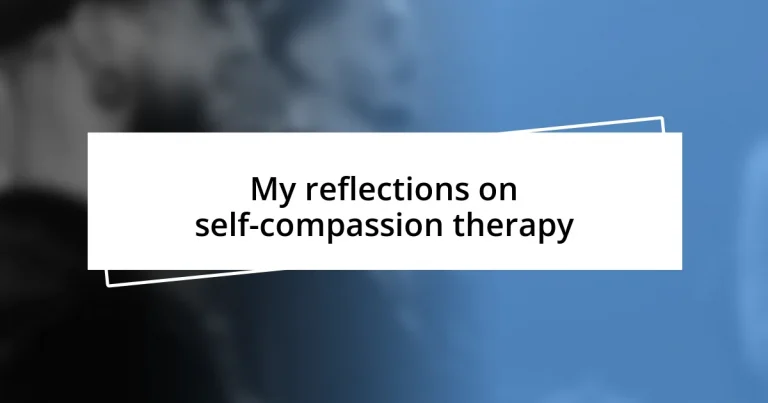Key takeaways:
- Self-compassion therapy emphasizes treating oneself with kindness, recognizing shared human experiences, and practicing mindfulness to foster emotional well-being.
- Key benefits of self-compassion include reduced anxiety, increased resilience, and improved relationships, creating a supportive environment for personal growth.
- Practicing self-compassion daily through techniques like mindful self-talk, compassionate journaling, and physical expression can transform one’s mindset and enhance emotional health.
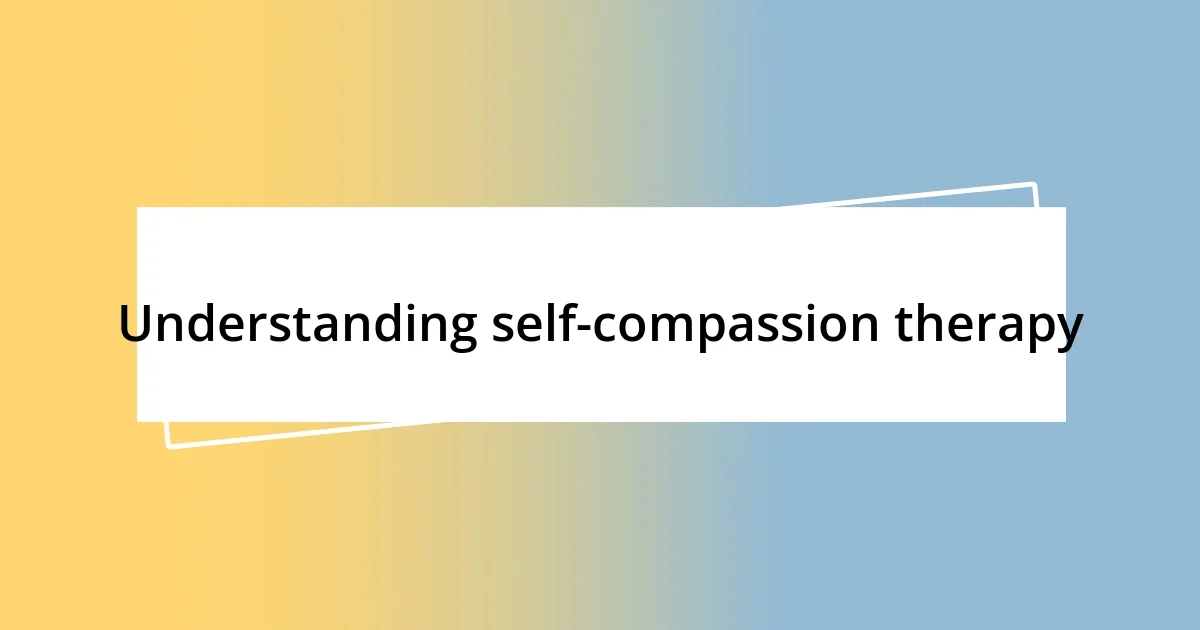
Understanding self-compassion therapy
Self-compassion therapy is all about treating yourself with the same kindness you would offer to a close friend. I remember a time when I was particularly hard on myself after a failed project. Instead of berating myself, I tried to recognize that everyone stumbles and that it’s perfectly human to make mistakes. This shift in perspective allowed me to feel lighter and more at ease with my imperfections.
The core principles of self-compassion therapy revolve around three components: self-kindness, common humanity, and mindfulness. Reflecting on my experiences, I often find that embracing common humanity—that idea that struggle is a shared experience—can be incredibly comforting. When I feel alone in my challenges, it’s easy to spiral into negativity. But when I remind myself that everyone faces difficulties, it brings a wave of relief and connection.
Have you ever noticed how often we dismiss our feelings? In self-compassion therapy, mindfulness plays a crucial role in acknowledging our emotions without judgment. I’ve learned that tuning into my thoughts—rather than zoning out or pushing them aside—creates space for healing. It’s like allowing myself to sit in the discomfort of a sad moment, which paradoxically makes it easier to move forward with grace and acceptance.
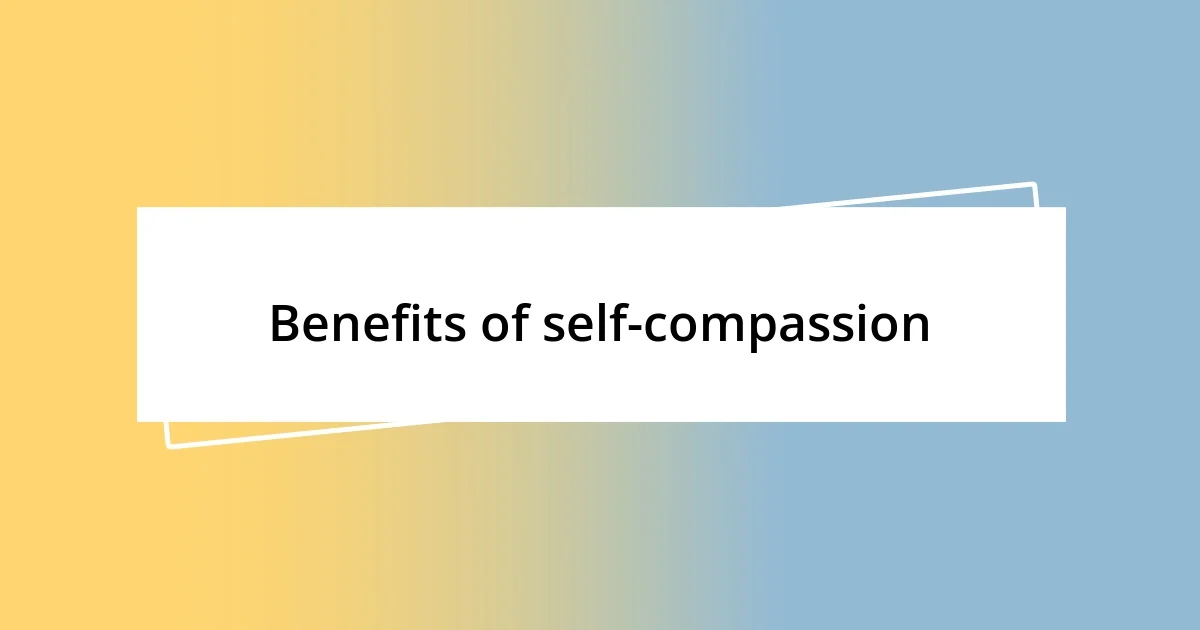
Benefits of self-compassion
Self-compassion offers numerous benefits that can significantly enhance our emotional well-being. For instance, I’ve found that when I practice self-compassion, it directly reduces my feelings of anxiety and self-doubt. Instead of spiraling into negative thoughts during tough times, I learn to be gentle with myself, which fosters a more supportive inner dialogue.
Additionally, self-compassion cultivates resilience in the face of challenges. I remember struggling through a demanding period at work. Rather than letting it overwhelm me, I embraced a self-compassionate approach, reminding myself that it was okay to feel stressed. This perspective not only helped me cope but also motivated me to push through with renewed energy and a more positive attitude.
Perhaps one of the most significant benefits I’ve experienced is the improved relationships with others. When I treat myself with kindness, I find it easier to extend that compassion to friends and family. It creates a ripple effect; as I become more forgiving of my own flaws, I become better at understanding and accepting others. This interconnectedness strengthens bonds and nurtures an environment of empathy and support.
| Benefit | Description |
|---|---|
| Reduced Anxiety | Practicing self-compassion can lower feelings of anxiety and self-doubt. |
| Increased Resilience | Helps in coping with challenges by fostering a positive and gentle inner dialogue. |
| Improved Relationships | Encourages empathy and forgiveness towards oneself and others. |
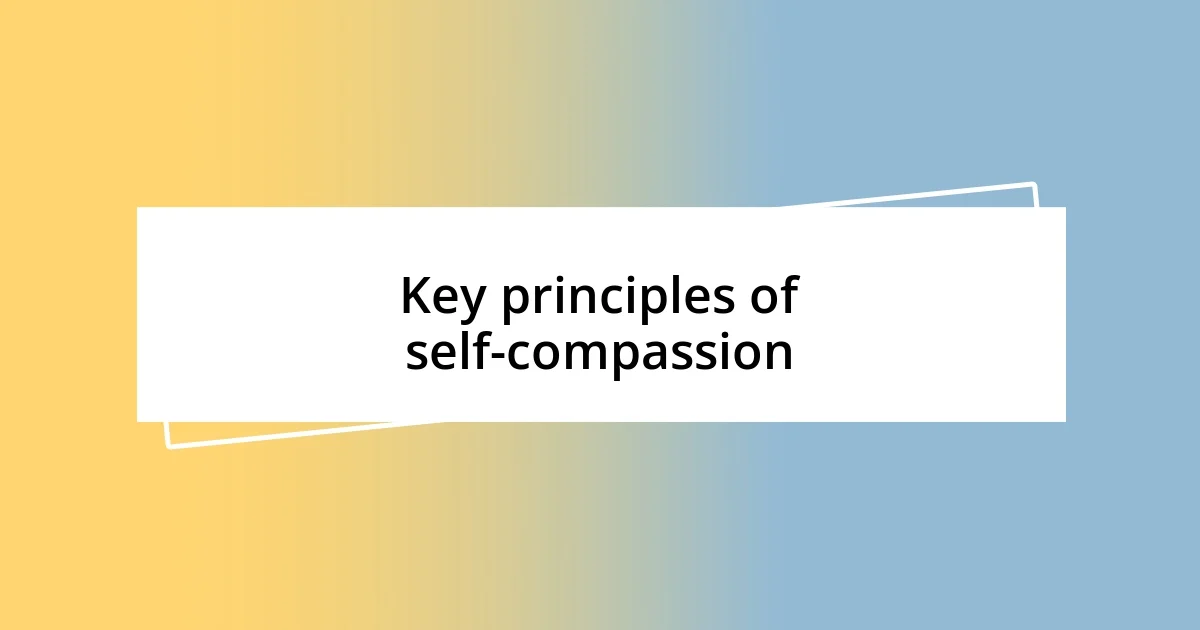
Key principles of self-compassion
Self-compassion is rooted in three key principles that can transform how we relate to ourselves. I vividly recall a moment when I felt overwhelmed by criticism—both from within and outside. It was during this turbulent time that I realized the importance of self-kindness. Instead of allowing harsh words to dominate my thoughts, I gently reminded myself that it’s okay to be imperfect. Embracing this principle changed my perspective entirely.
Here are the key principles of self-compassion:
- Self-Kindness: Treating ourselves with the warmth and understanding we would offer a friend, especially in times of struggle.
- Common Humanity: Recognizing that everyone experiences pain and setbacks, fostering a sense of connection instead of isolation.
- Mindfulness: Maintaining a balanced awareness of our thoughts and feelings without judgment, allowing space for healing and understanding.
Reflecting on these principles, I often think about how they intertwine. For instance, when I practice mindfulness, I acknowledge my mistakes without harsh judgment. There was a time when I lost an important deal, and rather than wallowing in self-blame, I focused on the learning experience it provided. This approach not only alleviated my initial distress but also reinforced my sense of shared human experience. In my journey, I’ve discovered that adopting these principles creates a profound ripple effect in my life.
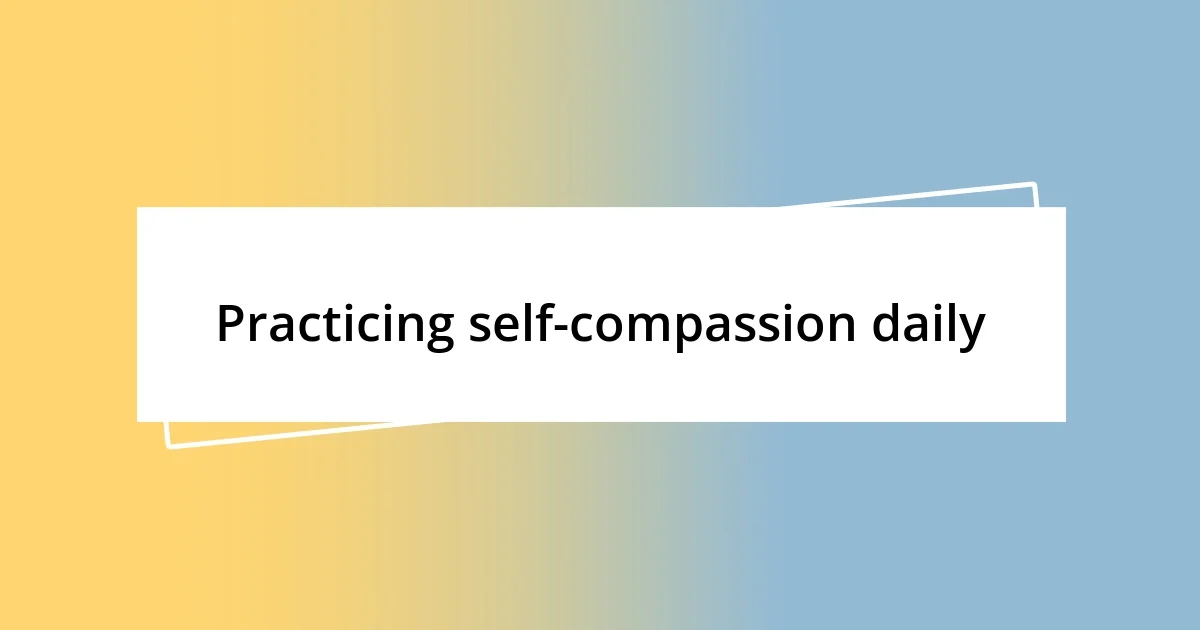
Practicing self-compassion daily
Practicing self-compassion daily has become a cornerstone of my emotional well-being. I remember a particularly challenging moment last year when I missed an important deadline. Instead of berating myself for my perceived failure, I took a step back and whispered, “It’s okay. Everyone makes mistakes.” That brief shift in perspective allowed me to regroup and concentrate on what I could do better next time, rather than getting stuck in shame.
I’ve found that integrating small self-compassionate rituals into my routine makes a significant difference. Every morning, I take a few minutes to reflect on things I appreciate about myself. Whether it’s my dedication or my kindness to others, I acknowledge these traits, which sets a positive tone for the day. Have you ever tried expressing gratitude toward yourself? It’s something as simple as looking in the mirror and recognizing your strengths, and it can truly uplift your mindset.
In moments of stress, I’ve learned that taking a pause to breathe deeply can be a game changer. I close my eyes and visualize a warm, comforting light enveloping me, reminding myself of the love and kindness I deserve. This practice doesn’t just feel like a break; it transforms my experience from one of overwhelm to a space where I can respond with self-kindness. Isn’t it fascinating how shifting our inner dialogue can lead to such profound changes in our daily lives?
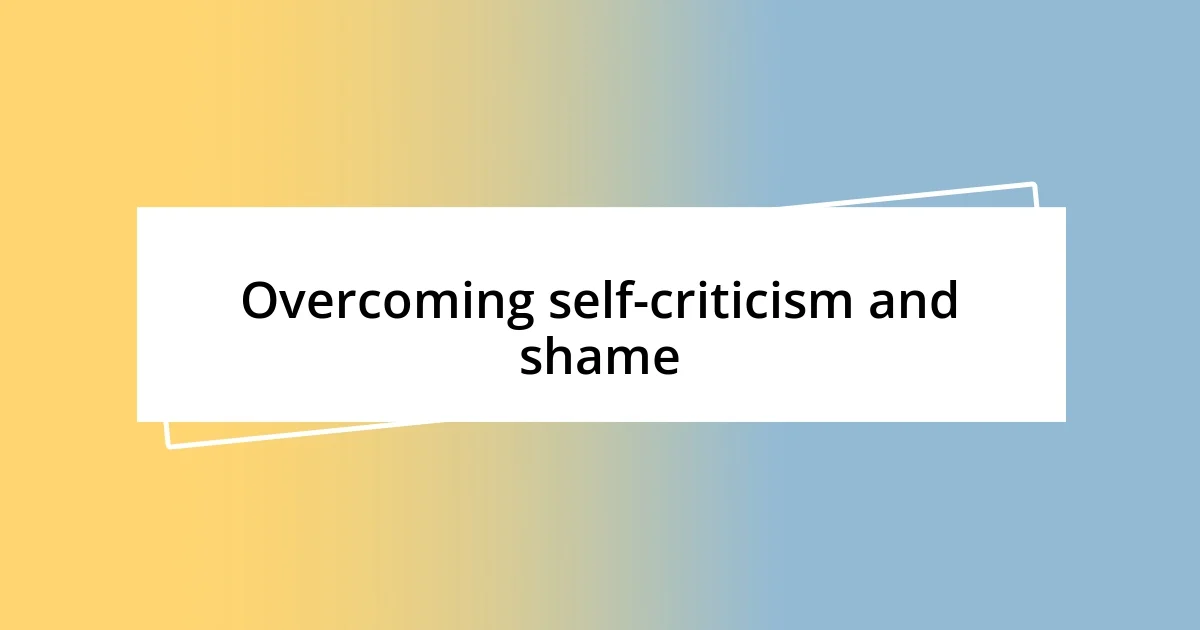
Overcoming self-criticism and shame
Overcoming self-criticism and shame is a journey that I often find challenging yet rewarding. I remember a specific time when I faced a significant setback—being passed over for a promotion I had worked hard for. Instead of letting that disappointment spiral into self-hatred, I consciously chose to reframe my thoughts. “What can I learn from this?” I asked myself, and that simple question opened the door to growth instead of despair.
There’s something powerful about recognizing how self-criticism can become a habit. I used to fall into the trap of replaying my perceived failures in my mind, as though playing a broken record. It was tiring! Now, when critical thoughts arise, I pause and remind myself that everyone faces challenges. This practice of acknowledging shared humanity has become essential in my life. Are we not all students navigating our own unique paths?
I’ve also found that talking to myself as I would to a friend works wonders. The other day, after making a careless mistake during a presentation, my internal voice shifted from harsh criticism to gentle encouragement. I told myself, “It’s just a minor slip; you can improve next time.” That moment of self-compassion not only reduced my shame but also refocused my energy toward constructive feedback. Have you ever considered how a gentle nudge from within can reshape your entire outlook? It’s a beautiful way to replace shame with empowerment.
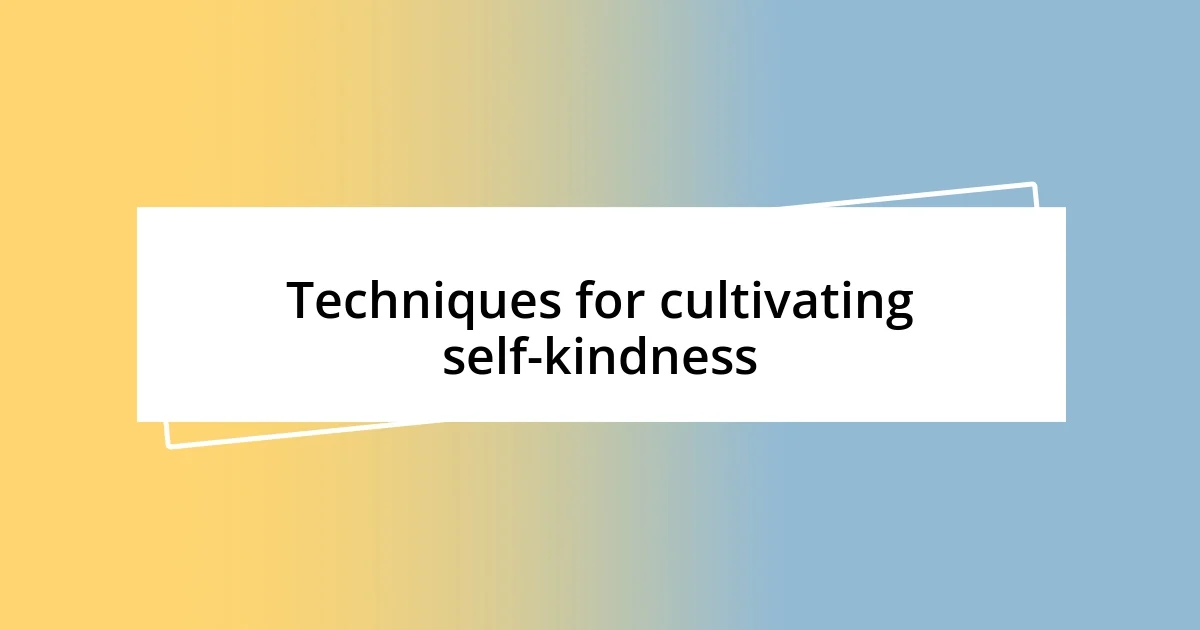
Techniques for cultivating self-kindness
Cultivating self-kindness can be incredibly rewarding, and I’ve noticed that writing a compassionate letter to myself can work wonders. I recall a particularly tough day where everything felt overwhelming. I took out my journal and penned down my feelings, reminding myself not only of the challenges but also of my resilience. It felt like sending a note of appreciation to a friend—recalling why I deserve kindness. Have you ever tried this method? You might be surprised at how much clarity and warmth it brings to your soul.
Another technique that has really resonated with me is engaging in mindful self-talk during moments of vulnerability. There was a time when I faced a disappointing review, and instead of bracing for a storm of self-judgment, I gently reminded myself, “This feedback doesn’t define me.” That small shift in my self-talk made me feel more grounded and open to learning from the experience. How often do we let a single critique overshadow our entire sense of self? It’s a habit worth breaking.
I’ve also found physical expression of self-kindness helpful, especially through movement. After a long week, I like to indulge in a dance session at home. Just the act of moving my body while letting go of stress creates a profound connection to my feelings and needs. Dancing freely, without judgment, allows me to embrace joy and playfulness. Have you ever considered what a simple dance could do to alleviate emotional heaviness? It’s a delightful reminder to be kind to myself and savor the moment.
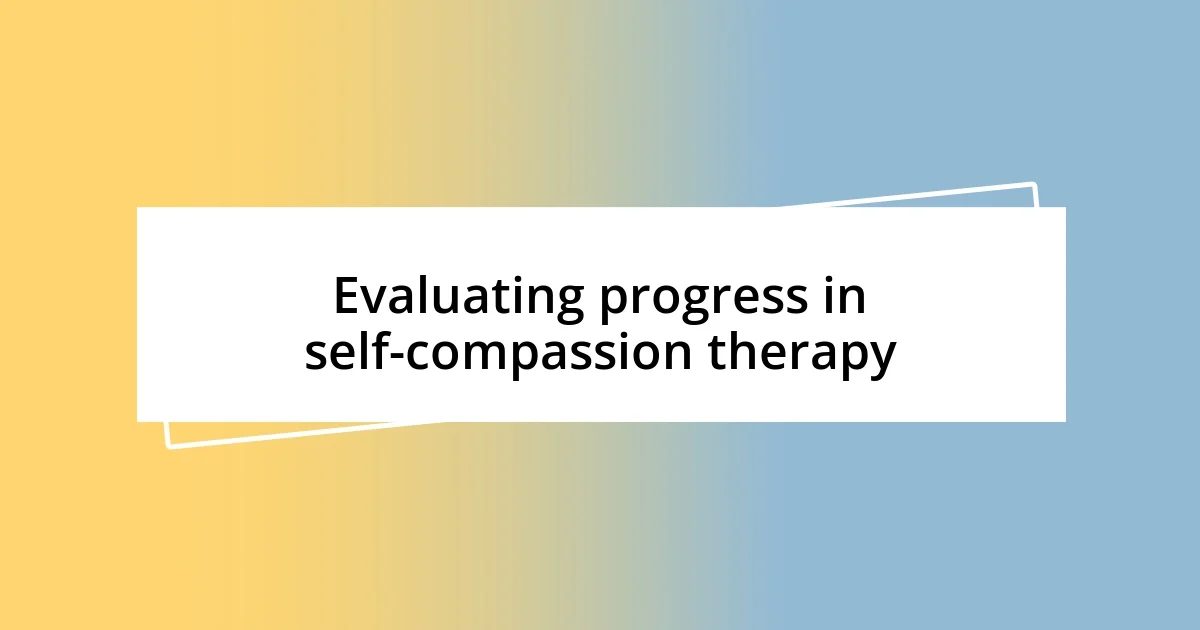
Evaluating progress in self-compassion therapy
Evaluating progress in self-compassion therapy can feel both revealing and liberating. I remember one moment during my journey when I realized I had gone a full week without harsh self-talk—a milestone for me! It made me reflect on how far I’d come; it was like spotting a rainbow after a storm. Have you ever noticed small shifts in your mindset that left you feeling lighter?
Tracking my emotions over time has also been an eye-opener. By maintaining a simple journal of my feelings and self-reflections, I could see patterns emerging. There was a time when I would write pages filled with self-criticism, but it became increasingly common to notice joy and self-acceptance creeping into my entries. How does it feel when you witness such transformations in your own thoughts? It’s empowering, isn’t it?
Another way I evaluate my progress is through my relationships. I’ve noticed that as I cultivate self-compassion, my interactions with others have improved significantly. During a recent gathering, instead of feeling inadequate compared to my peers, I found myself genuinely celebrating their successes. This shift from comparison to connection has deepened my friendships and allowed me to embrace joy without conditions. Can you remember a time when your newfound compassion for yourself enriched your connections with others? It’s a beautiful ripple effect that enhances every area of life.












